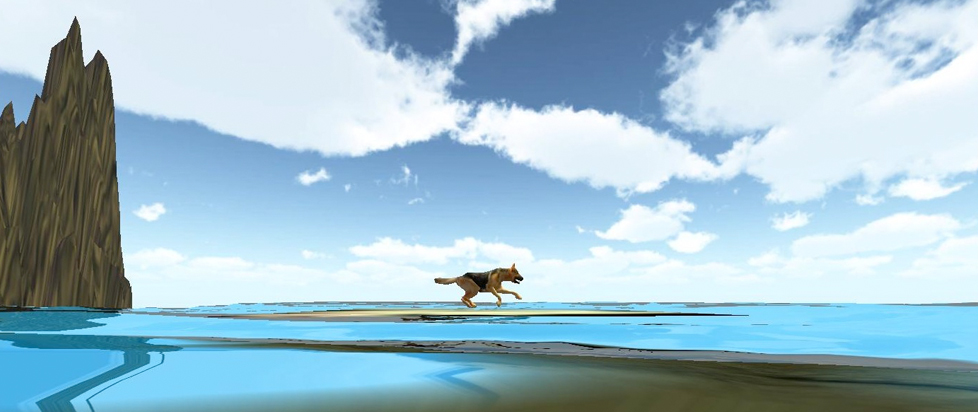Warmth from Ice
I’ve heard people compare Ed Key and David Kanaga’s Proteus to many things this year: an acid trip, a patchwork of pixels, tantric sex and most peculiarly, a mash-up of Minecraft and Halo. But for me there’s a far better comparison to be drawn than any of these, one that sums up my relationship with this often abstruse videogame better than any other: that of the semi-frozen sugar syrup, sorbet.
Hear me out.
 Sorbet is a simple, unassuming dessert, constructed of little more than flavored water and sugar, frozen and blended. Similarly, Proteus is a simple and unassuming videogame, constructed of little else than pastel pixels and polygonal landscapes, composed and randomized. Sorbet lacks the lavish extravagance of its dairy-based brethren, ice cream, much like Proteus eschews the frivolity of the bump-mapped, high-resolution textures adorning its peers, instead opting for light, retro-styled cell shading.
Sorbet is a simple, unassuming dessert, constructed of little more than flavored water and sugar, frozen and blended. Similarly, Proteus is a simple and unassuming videogame, constructed of little else than pastel pixels and polygonal landscapes, composed and randomized. Sorbet lacks the lavish extravagance of its dairy-based brethren, ice cream, much like Proteus eschews the frivolity of the bump-mapped, high-resolution textures adorning its peers, instead opting for light, retro-styled cell shading.
Both of these creations have a decided simplicity to their appeal: sorbet isn’t a grandiose display of culinary extravagance, but a humble solidified ball of the most common liquid molecule on earth. And just as sorbet proves that simple food can be delicious, Proteus is a poignant reminder that simplicity in videogame design is a powerful tool, demonstrating that photorealism isn’t necessarily the pathway to emotional resonance, that discovery in videogames is often most powerful when left to occur organically and that games can be equally if not more affecting as simple experiences than as difficult challenges.
They’re both fulfilling, and yet not too filling. But it’s more than just the congruity of their aesthetics, design and feel that leads me to this comparison; there’s a deeper similarity lying beneath the surface of each. I liken Proteus to sorbet, not just because of its granular complexion or its pale hues, but because I find it to be something of a videogame palate cleanser.
Just as one would use a sorbet to remove the cloying filth of excess fats and proteins following a gluttonous meal, I find myself, time and time again, drawn to the cleansing tranquility of Proteus after the meatier dishes of 2012’s videogame release calendar. The Darkness 2, Mass Effect 3, Prototype 2, Resident Evil 6 and now Dishonored have all been followed by a healthy dose of wandering through Proteus’ refreshing, relaxing landscapes.
Rarely have I returned to a game as consistently since first playing it just to experience an atmosphere. But I wander back into Key and Kanaga’s experientially erudite universe time and time again to wash away the accumulated excess of complex mechanics, frustrating deaths and difficult puzzles that constitute modern big-budget videogames, just to bathe in the simple clarity of pixelated polygonal art at its finest.
 Proteus recharges my appetite for videogame exploration; all there is to do is wander and discover random little events at your own pace, and whether it’s a leaping frog, harmonizing plants, a shuffling cast of crabs or a beautiful aurora, there’s always something to happen across, something to put a smile on your face and something that fits perfectly with the soothing ambiance of David Kanaga’s electro-synth.
Proteus recharges my appetite for videogame exploration; all there is to do is wander and discover random little events at your own pace, and whether it’s a leaping frog, harmonizing plants, a shuffling cast of crabs or a beautiful aurora, there’s always something to happen across, something to put a smile on your face and something that fits perfectly with the soothing ambiance of David Kanaga’s electro-synth.
More than any other adventure since Wind Waker, Proteus captures the essence of what makes exploration in videogames special for me – getting lost in the joy of innocent discovery. On a less allegorical level, maybe that’s why I associate Proteus with sorbet.
When I was a child, my mother would make me and my brother her own homemade style of sorbet as a cooling summer treat. She’d mix two glugs of cordial and some mashed-up fruit with a full pint of water, place it into a freezer mold for a couple of hours and once set, break it down into tiny crystals. It was hardly a culinary pièce de résistance, but it was still a delicious snack I would often enjoy on a warm day before galloping off into the fields of the farm I grew up on to explore the land and wildlife (in between my explorations of Hyrule, of course).
Both Proteus and sorbet remind me of a time when everything was a discovery waiting to happen, when venturing out into the wilderness brought new and wondrous experiences, evoking questions about what surprises awaited over each hill.
Now, as an adult, I find there’s less to discover in the world as innocence drains from the horizon, but playing Proteus is a consistent reminder of those halcyon sugary-ice-fueled summer days spent exploring, one that consistently renews my appetite for adventure, washes away my videogame fatigue and lets me view the world with simpler, more magical eyes as we all once did. And as it turns out, it looked a bit like sorbet.





